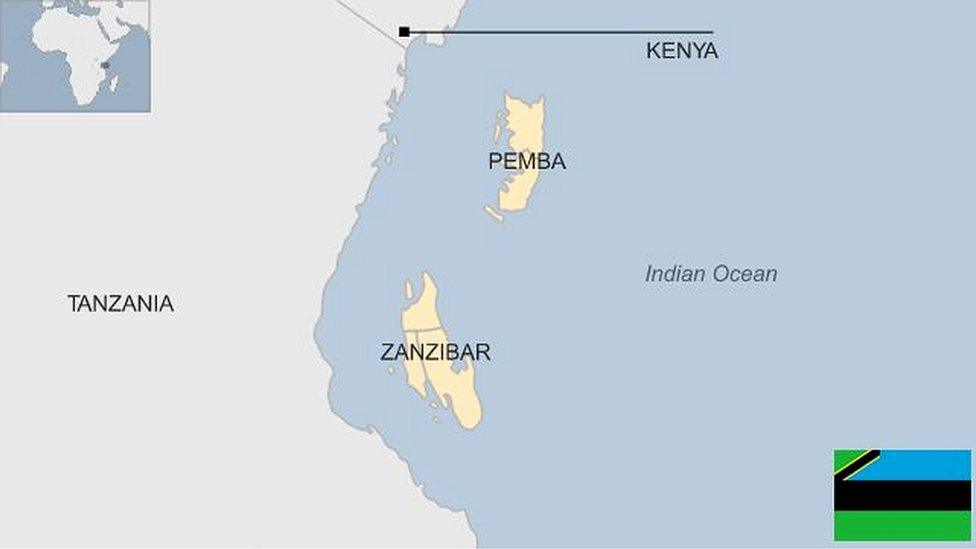Zanzibar acid attack victims are 'well' say doctors
- Published
The BBC's Alastair Leithead: Katie Gee and Kirstie Trup "arrived shaken and traumatised"
Two British women who had acid thrown in their faces in Zanzibar have been described as "well" by doctors treating them on their return to the UK.
Kirstie Trup and Katie Gee, both 18 and from north London, landed at RAF Northolt at about 13:45 and went by ambulance to hospital in west London.
Zanzibar police have offered a £4,000 reward for information leading to capture of the suspects.
A police commissioner told the BBC several people were being questioned.
However, no motive has yet been established and the investigation continues.
Alternative Offered
Andy Williams, who is a burns and plastic surgeon at Chelsea and Westminster Hospital, in west London, said the pair's injuries were being assessed.
"Both girls are well, and their families are with them," he said.
"They will be staying at Chelsea and Westminster Hospital. Both families would like to thank everyone that's helped to bring the girls back."
Katie Gee thanked supporters for their good wishes, writing on Twitter: "Thank you for all your support x".
The teenagers' mothers, Rochelle Trup and Nicky Gee, said they were "extremely upset" by the "completely unprovoked attack" carried out by two men on a moped.
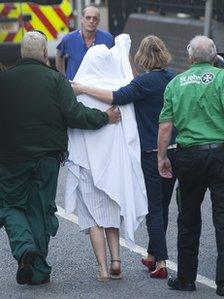
The victims have been taken to Chelsea and Westminster Hospital
Police said acid was thrown on the teenagers' faces, chests and hands as they walked through the streets of Stone Town, the old part of the island's capital Zanzibar City, on Wednesday evening.
A spokeswoman for i-to-i Travel, which organised the women's volunteering trip, confirmed they had been repatriated.
She said customers due to arrive in Zanzibar this weekend had been given the option to volunteer at an alternative project but all had chosen to continue to travel to Tanzania.
A British tourist, who gave his name as Sam, tried to help the pair after the attack.
He said he and others started to hose down the pair in a restaurant toilet.
"They were obviously extremely shocked and in a huge amount of pain and stress and we, having no medical knowledge or background at all, were doing what we could," he said.
'Lovely daughters'
Reporting from the scene, the BBC's Alastair Leithead said the attackers sped away after the incident, and police do not know why the women were targeted.
The women's mothers said in a statement issued on Thursday: "Both families are extremely upset and distressed at this completely unprovoked attack on their lovely daughters who had only gone to Zanzibar with good intention."
The victims were two weeks into a three-week trip.
Kari Korhonen, co-director of Art in Tanzania, the charity the women had been volunteering for, said they were "OK considering the seriousness of this type of case".
Another spokesman for the charity said they had been on their way to dinner when the attack happened.
Police on Zanzibar said it was the first time foreigners had been attacked in this way.
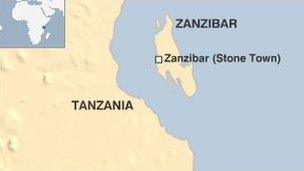
The Foreign Office said it was concerned to hear of the attack and was providing consular assistance.
The BBC's Tulanana Bohela, in Dar es Salaam, said Islam is the main religion on Zanzibar and in more remote parts of the island, away from tourist beaches, there are signs asking foreigners to respect the local culture and cover up - in case skimpy outfits upset villagers.
However, most islanders depend on tourism for their livelihoods and are happy to see tourists and there is little antagonism towards them, she said.
'Economic pillar'
Tanzania's President Jakaya Kikwete visited the women at the Aga Khan Hospital in Dar es Salaam, the country's largest city, and promised that the men responsible for the "shameful" attack would be found.
Tanzania's minister of information, tourism, culture and sports, Said Ali Mbarouk, said: "I beg our nationals, this is not something they should be doing.
Kirstie Trup and Katie Gee arrived at RAF Northolt by air ambulance
"Tourism is the strongest pillar of our economy, so if we do such acts we are killing our economy, and our livelihoods in general.
"So it is not an honourable thing to do, it's a bad thing and it should be condemned by all citizens of Zanzibar."
The Foreign Office's travel advice says 75,000 British nationals visit Tanzania - including semi-autonomous Zanzibar - every year and most have "trouble free" visits.
But it warns that "violent and armed crime is increasing" and "there is an underlying threat from terrorism".
It also says "mugging, bag snatching (especially from passing cars) and robbery have increased throughout the country" and "in Zanzibar incidents have taken place in Stone Town and on popular tourist beaches".
Recent attacks in Zanzibar include an acid attack on a Muslim cleric in November, and the shooting dead of a Catholic priest in February. Another priest was shot and wounded in December.
- Published9 August 2013
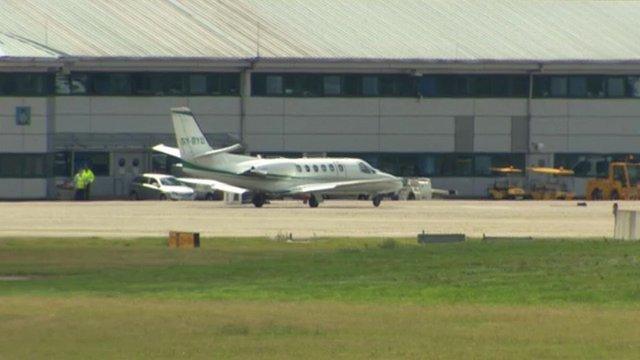
- Published9 August 2013
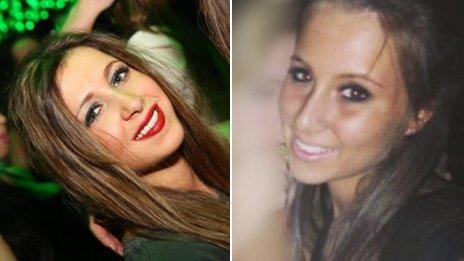
- Published8 August 2013

- Published2 May 2023
